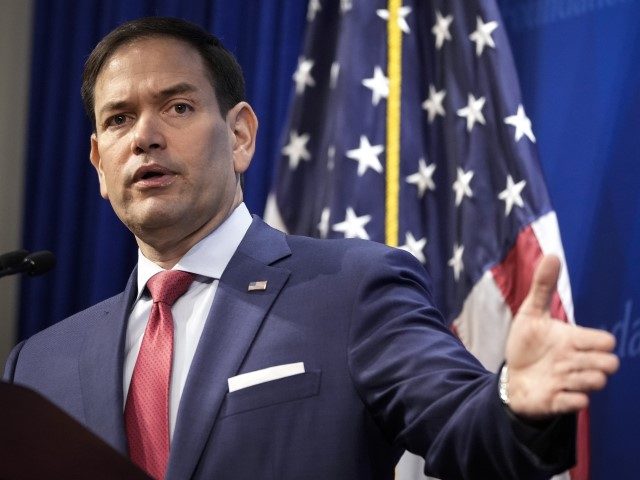Sen. Marco Rubio (R-FL) warned during a Congressional hearing on Thursday that China is moving to capitalize on a severe “economic downturn” in Latin America partially fueled by Chinese coronavirus lockdowns to expand its influence there.
America “simply can’t afford to let the Chinese Communist Party expand its influence and absorb Latin America and the Caribbean into its private political-economic bloc,” Rubio asserted.
The senator made the remarks during a hearing hosted by the Senate Committee on Foreign Relations addressing China’s role in the Western Hemisphere. The day before the hearing, a congressional oversight committee in Ecuador revealed that the country had lost $5 billion in oil profits thanks to a deal brokered with China for a predatory loan under socialist former President Rafael Correa.
China has greatly expanded its ties to Latin America’s leftist governments – particularly in Venezuela, Cuba, Nicaragua, and Argentina – in the last two decades. In countries like Ecuador, China took advantage of leftist presidents later voted out of office to sign agreements that future conservative leaders had no power to overturn. Even in Latin American nations with conservative leadership, like Brazil, China’s Communist Party has retained top trade partner status and received praise for its economic prowess from self-proclaimed anti-communist leaders like Jair Bolsonaro.
Observing that the Western Hemisphere is suffering “extraordinary upheaval” and “tremendous” economic challenges fueled in part by Chinese coronavirus pandemic lockdowns and mismanagement, Rubio warned that China was “seizing the opportunity to grow both their influence and their power in the Western Hemisphere.”
“As an example, their Belt and Road Initiative uses massive infrastructure loans and projects to lure nations into economic and political dependency — debt traps. That’s now spread to Argentina, Brazil, Barbados, and Panama,” Rubio explained. “And in their annual report last year, the bipartisan US-China Security and Economic Review Commission found that the Communist Party of China is taking advantage of its economic importance and political relationships to encourage governments across the region to make domestic and foreign policy decisions that favor the CCP and undermine democracy and free markets in the region.”

Brazil’s President Jair Bolsonaro (R) gifts China’s President Xi Jinping (L) a jacket at the end of the signing ceremony at the Great Hall of the People in Beijing on October 25, 2019. (Photo by Yukie Nishizawa / POOL / AFP) (Photo by YUKIE NISHIZAWA/POOL/AFP via Getty Images)
The commission report, he continued, also warned that China’s People’s Liberation Army “is seeking to deepen its engagement in the region by funding the construction of ports and space programs and other dual-use infrastructure,” a potential attempt to lay the groundwork for future Chinese military bases.
“We simply can’t afford to let the Chinese Communist Party expand its influence and absorb Latin America and the Caribbean into its private political-economic bloc,” Rubio concluded. “That would leave our country worse off and ensnare the people of Latin America and the Caribbean into a generation of suffering and repression.”
In similar remarks to the Associated Press this week, Rubio expressed frustration that America’s foreign policy focuses so much more effort into combatting the malign influence of Russia than of China.
“Russia is an acute problem and it is a current challenge,” Rubio was reported as saying, “but it’s a five-year or ten-year problem. China is a 100-year problem, both in the region and internationally.”
Russia maintains close ties with several American enemies in the region, most prominently Cuba and Venezuela, which has hosted Russian nuclear-capable bombers in the past. Both countries also have close financial and political ties to the Chinese Communist Party.

Brazil’s President Jair Bolsonaro (R) gifts China’s President Xi Jinping (L) a soccer jersey at the end of the signing ceremony at the Great Hall of the People in Beijing on October 25, 2019. (YUKIE NISHIZAWA/POOL/AFP via Getty Images)
In 2018, following years of protests that had threatened dictator Nicolás Maduro’s ability to stay at the helm of the country, the Venezuelan socialist leader visited Beijing and came home with a $5 billion credit line, to be financed by future oil payments. Maduro also secured a “strategic alliance on gold mining” from the Chinese Communist Party and signed agreements on agriculture and technology. A year later, Reuters revealed that one of those deals, with the Chinese state-run CAMC engineering corporation, resulted in billion-dollar gains for China with no visible results for Venezuela. CAMC had promised to build major infrastructure and a large rice-processing plant.
Loans in exchange for raw natural resources are not an uncommon Chinese practice. In Ecuador, a former OPEC country, officials are still reeling from the results of a similar agreement signed during socialist President Correa’s tenure. The Ecuadorian government revealed in a 200-page report this week that deals signed between 2009 and 2016 gave China access to oil at a $3.60-per-barrel discount, resulting in a $5-billion loss for the country as the rate of purchase was fixed before oil prices skyrocketed.
Alarming revelations like these – and analogous situations in places like Kenya, Rwanda, and Nigeria – have done little to stop other socialist leaders from signing agreements with China. In Argentina this February, current socialist President Alberto Fernández formally joined the Belt and Road Initiative, China’s signature debt-trap infrastructure plan. Fernández also signed a deal that month for China to build a nuclear power plant in the country with $8 billion in Chinese financing, the details of which are not public.
Under current President Jair Bolsonaro, Brazil has continued a similar trajectory of Chinese investment, despite Bolsonaro hinting as a candidate in 2018 that he was worried about Chinese financial influence in the country. In 2019, Bolsonaro made a trip to Beijing similar to Fernández’s this year, gifting Chinese dictator Xi Jinping a soccer jersey and declaring, “Brazil needs China and China needs Brazil.”
Bolsonaro boasted then that the two countries were “completely aligned, in a way that reaches beyond our commercial and business relationship.” He has also falsely referred to China as a “capitalist” country.
Last year, Bolsonaro’s top diplomat, former Foreign Affairs Minister Ernesto Araújo, resigned after complaining that he was facing intense pressure to allow Chinese telecommunications giant Huawei to build Brazil’s 5G network.

COMMENTS
Please let us know if you're having issues with commenting.